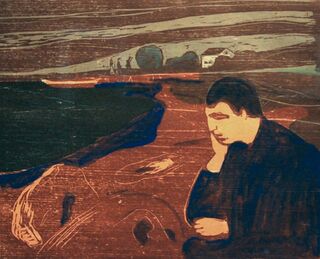Dark Triad
A Connection Between Dark Triad Traits and Attitudes to Having Children
What do people high in antisocial traits think about procreation?
Posted September 26, 2021 Reviewed by Kaja Perina
In a previous post, I discussed whether socially aversive traits known as the “dark triad” of personality – psychopathy, Machiavellianism, and narcissism – are adaptive in an evolutionary sense or whether they are pathologies that decrease an individual’s reproductive fitness.
To recap briefly, I discussed evidence that although narcissism (i.e., a grandiose sense of one’s own superiority) is adaptive in various respects, psychopathy and Machiavellianism (i.e., callous disregard for the rights of others and a cynical, manipulative approach to social interaction, respectively) appear to be more maladaptive (Jonason et al., 2015). In this article, I also discuss a recent study (Schönegger, 2021) that linked dark triad traits to anti-natalism – the view that procreation is morally wrong – and suggest that these traits, especially psychopathy and Machiavellianism, might reduce reproductive fitness by fostering a negative attitude to having children.
How are dark triad traits linked to how many children people have?
Of direct relevance to the question of reproductive fitness is the number of children a person has had. Little research has examined how dark traits are related to this outcome, with somewhat mixed results. A study examining psychopathy in male Serbian prisoners found that interpersonal psychopathic traits (e.g., glibness/superficial charm, manipulative, grandiose sense of self) were associated with having more children, while other psychopathic traits related to emotional deficits (e.g., lack of empathy, callousness) and an erratic lifestyle (e.g., lack of realistic, long-term goals, impulsivity) were associated with having fewer children. A survey of men and women drawn from the general population rather than prisoners, on the other hand, found that people high in psychopathy had fewer children, while men but not women high in narcissism had more children, and Machiavellianism had no effect (Carter et al., 2018). The author suggested that narcissistic men might have had more children because women see them as higher-status mates and choose them for both long-term partnerships and extra-marital affairs. Psychopathy, on the other hand, is related to poorer sexual health (e.g., increased rates of sexually transmitted diseases), which might adversely affect fertility.

Anti-natalism, the dark triad, and depression
Another issue that might be relevant to reproductive fitness is one’s attitude to having children, specifically, whether one thinks that procreation is good or bad. Amazing as it may seem, some philosophers have seriously argued this point. In particular, David Benatar, author of “Better never to have been: The harm of coming into existence,” argued (in a nutshell) that existence involves pain and suffering, whereas non-existence does not; hence, existence is worse than non-existence, therefore, it is morally wrong to bring people into the world. (This blog post describes this argument in more detail and points out logical problems with it.) Although Benatar’s views are not widely shared, they inspired a recent study (Schönegger, 2021) to find out how common anti-natalist views are in lay people, and whether they are associated with dark triad traits and depression. The author argued that as anti-natalism is not widely accepted, people with dark triad traits, whose moral views tend to be at odds with social norms, might be more willing to endorse it. Additionally, people with such traits often have a cynical and hostile view of human nature that might lead them to devalue life. Furthermore, people who are depressed might be more inclined to see existence as more bad than good, and so be more inclined to anti-natalism.
The author surveyed the same set of people in the US twice, once in February 2020 and again in April. By coincidence, the first US death from COVID-19 occurred the day after the first survey, while the follow-up was conducted while the majority of US states had entered periods of lockdown. This allowed a test of whether the pandemic/lockdowns would affect people’s views on anti-natalism. Participants in the surveys indicated how much they agreed or disagreed with four arguments for anti-natalism: a misanthropic argument (humans cause so much harm that it is wrong to procreate), two different versions of Benatar’s argument (the first one simplified, the second with a more detailed explanation of his reasoning), and a more limited or “local” argument that prospective parents who think that any child of their will have a miserable life should not procreate. Hence, the first three argued for complete anti-natalism, while the fourth argued for it only in specific circumstances.
On average, people did not agree with the first three anti-natalist items, although there was mild average agreement with local anti-natalism. All anti-natalist items were positively correlated with each other, although local anti-natalism had weaker correlations with the other arguments.

In the February survey, all three dark triad traits were positively correlated with all four arguments, with the exception that narcissism was not correlated with local anti-natalism. Additionally, narcissism had weaker correlations with the other arguments compared to psychopathy and Machiavellianism, which correlated rather strongly with the first three arguments. In the April follow-up, psychopathy and Machiavellianism remained positively correlated with all four arguments, especially the first three, while narcissism was no longer correlated with any of them. Interestingly, participants’ anti-natalism scores did not change between the two surveys, indicating that being in lockdown had no effect on their views. Furthermore, depression was positively correlated with anti-natalism in both surveys.
The author examined whether depression mediated the relationship between the dark triad traits and anti-natalism, i.e., whether there was an indirect link between them that was accounted for by higher depression. Depression mediated the links between psychopathy and Machiavellianism and anti-natalism, but not that of narcissism. That is, psychopathy and Machiavellianism were each linked with higher depression, which in turn was linked with higher anti-natalism. This is in accord with previous findings that psychopathy and Machiavellianism, but not narcissism, are related to more depression and more negative health outcomes generally (Jonason et al., 2015).
Does anti-natalism affect reproductive fitness?
Research has not yet examined whether having anti-natalist views is associated with having fewer (or no) children, but it seems like a good bet. Insofar as dark triad traits, especially psychopathy and Machiavellianism, are associated with more negative views of procreation, they are likely to have adverse effects on reproductive fitness. Hence, they are likely to be maladaptive in an evolutionary sense. It would also be interesting to examine how general personality traits, such as those from the “Big Five” traits of extraversion, agreeableness, conscientiousness, neuroticism, and openness to experience, are related to anti-natalism.
The dark triad traits have a common core of low agreeableness, which represents interpersonal antagonism. Additionally, psychopathy and Machiavellianism have small positive relations with neuroticism (O’Boyle et al., 2015), which might account for why they are linked with depression, while narcissism is associated with high extraversion, which is associated with a general positivity bias. Hence, it would be interesting to see whether low agreeableness and high neuroticism are also associated with agreement with anti-natalism, and if extraversion is associated with rejection of it.
References
Carter, G. L., Lyons, M., & Brewer, G. (2018). Lifetime offspring and the Dark Triad. Personality and Individual Differences, 132, 79–83. https://doi.org/10.1016/j.paid.2018.05.017
Jonason, P. K., Baughman, H. M., Carter, G. L., & Parker, P. (2015). Dorian Gray without his portrait: Psychological, social, and physical health costs associated with the Dark Triad. Personality and Individual Differences, 78, 5–13. https://doi.org/10.1016/j.paid.2015.01.008
O’Boyle, E. H., Forsyth, D. R., Banks, G. C., Story, P. A., & White, C. D. (2015). A Meta-Analytic Test of Redundancy and Relative Importance of the Dark Triad and Five-Factor Model of Personality. Journal of Personality, 83(6), 644–664. https://doi.org/10.1111/jopy.12126
Schönegger, P. (2021). What’s up with anti-natalists? An observational study on the relationship between dark triad personality traits and anti-natalist views. Philosophical Psychology, 1–29. https://doi.org/10.1080/09515089.2021.1946026




